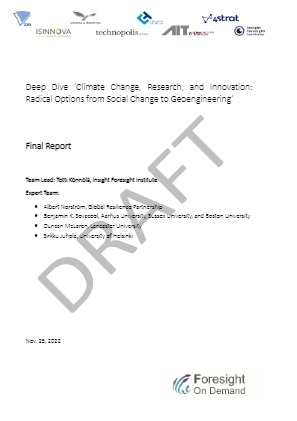
Climate change impacts are one of the main threats to human society and natural ecosystems. Even though natural dynamics also have a substantial effect on climate, there is no doubt that current alterations of climate with the correlated impacts are manmade. Alongside continuing efforts to reduce emissions and adapt to climate change, there may be possibilities to geoengineer climate systems to reduce or mask the impacts of climate change. There are also strong arguments for large-scale changes in social practices for adapting to and mitigating climate change. The big challenge comes with the necessary scale of interventions as those changes need to be large-scale and global, putting new challenges to all levels of governance from local to global.
Many present drivers seem to indicate a gloomy future for the climate. The current individualistic mindsets drive overconsumption and overproduction. The offsetting of carbon emissions is sometimes used to compensate for dirty activities. Intense competition for natural resources is not safeguarding their sustainability. Bio-holistic worldviews confront anthropocentric views, but climate delay has emerged as the new denial and the lack of courage to address climate supremacists, i.e. the global wealthy, shows little change of direction. According to a 2020 report from Oxfam and the Stockholm Environment Institute, the wealthiest top 1% were responsible for 15% of global emissions, nearly twice as much as the world’s poorest 50%, who were responsible for just 7%. Overly optimistic beliefs in tech or social transformation to solve it prevail, and there is a wide reluctance to consider broad system change.
There are also drivers towards desired futures. Improved understanding of climate and global change and the capacity and knowledge to purposefully shape nature and society provide better means to address climate change. Climate anxiety and perception of government inaction have triggered, for instance, the ‘Fridays for future’ movement, which contributes to the emergence of global conscience on the climate and biodiversity crisis and the need for justice. New understandings of human purpose and fairness also encourage the development of a wider range of responses like de-desertification, seaweed permaculture, ocean fertilization, carbon capture and storage, and solar radiation management. We may learn to protect the global commons, including indigenous cultures and atmospheric commons.
Economic growth in societies based on individual material gain, here-and-now-thinking, short political cycles, and lack of broad political agreement on alternative paths seem to keep us on the path to the climate crisis. Furthermore, exacerbated social inequalities may lead many to have no willingness or ability to participate in transitions. While we are overconfident with systems’ design, we underestimate natural forces and ecosystems. Emerging options for large-scale ‘geoengineering’ interventions in the climate system promise new opportunities and new risks, including novel geopolitical tensions.There are diverse perceptions on geoengineering and possible social change towards potential acceptance or societal rejection. The planet lacks a fair and appropriate governance structure providing a framework on who might be entitled to carry out geoengineering projects in the name of the planet and what their responsibility is. There is no sufficient dialogue on what it means to be a responsible company, researcher, research organisation, or policy-maker in this context.
This deep dive is part of the Foresight towards the 2nd Strategic Plan of Horizon Europe project.




